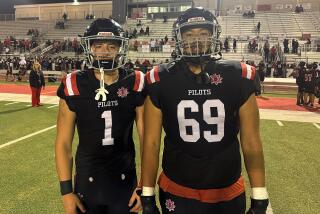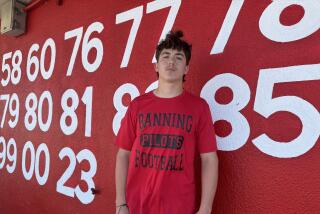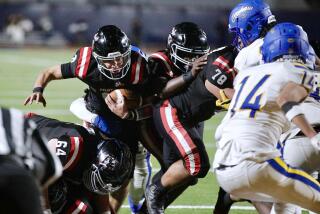A Brother’s Kidney Gives S.D. Transplant Recipient New Lease on Life
David Banning is short a kidney.
Yet the 38-year-old Trabuco Canyon carpenter feels good about donating a kidney to his youngest brother, Bill, liberating Bill from the dialysis machine that has kept him alive since October.
Bill Banning, 29, is not in the clear yet. The former Navy petty officer was rushed to UC San Diego Medical Center the weekend of Feb. 20 with a fever and chills--signs that his body might be rejecting the kidney donated by David in a transplant operation Feb. 11.
But on Friday he was discharged from the hospital, and doctors held out hope that the kidney would give him a new lease on life.
“It never ceases to awe me,” Dr. Nicholas A. Halasz, director of transplant operations at UCSD Medical Center, said of the donation. “There’s nothing more unselfish to do than this.”
Bill learned that his kidneys were failing in 1978, during a physical exam to qualify as a jet crew member on the aircraft carrier Ranger. He had to retire from the Navy with a medical discharge shortly thereafter.
“The doctor told him, ‘Your kidneys might last one week or 11 years,’ ” recalled David at his cozy house off a dirt road in Trabuco Canyon, where he has been convalescing since his left kidney was removed.
For Bill, who had planned to make a career of the Navy after graduating from Mission Viejo High School in 1976, the news came as a shock. “All of a sudden I was out in the street because of a physical problem.
“I had good marks, was made a petty officer. . . . I would have made a good sailor,” he said softly, adding that he misses “the steady paycheck, the discipline, knowing exactly what I was supposed to do every day.”
He is making a living as an electronics technician in San Diego County and working toward an associate degree in liberal arts at Mesa Junior College.
His doctors say he is suffering from a rare form of chronic kidney failure that occurs in 10% of kidney malfunctions. Urine was backing up in his ureters (tubes connecting the kidneys to the bladder), pressuring the kidneys, Halasz said.
After a series of checkups at San Diego’s Naval Hospital, Bill learned last year that he would have to undergo painful kidney dialysis treatments twice a week, a procedure he described as “traumatic” when it began Oct. 1.
A few days later, Bill said, “David called me and said, ‘What’s this about (dialysis)? When can we do the transplant?’ ”
David remembers the revulsion he felt at the dialysis treatment center. “(They) stick their big needles in your arm. (It) looks like it’s been butchered. . . . If there’s any way to get off (dialysis), you do it.
“I knew for a long time that sometime we’d have to have a transplant,” he added. “I was the only one of four kids that had the right blood type.”
Bill was uncertain, however, and more for his brother’s sake than his own.
“My basic question was how it was going to affect David. . . . I wanted him to know exactly what to expect, how his life would change. Up till now, my problems have been self-dealt with,” he said.
But David, whose left kidney was sewn in front of Bill’s pair of failing organs, does not worry about himself.
“I lose my backup, that’s what it amounts to,” he said, adding that he expects to return to work framing houses within six weeks and to resume running five times a week and working out with weights even sooner.
Dr. Halasz said David’s remaining kidney will grow stronger and larger and eventually will take over up to 94% of the job both kidneys were tackling before.
For Bill, since the organ came from a living relative, there is a better than 95% chance that the transplanted kidney will be functioning normally after the first year, contrasted with an 80% success rate for organs from someone else, Halasz said.
He said of his brother: “I can’t put in words how I feel (about) what he’s done for me.”
More to Read
Sign up for Essential California
The most important California stories and recommendations in your inbox every morning.
You may occasionally receive promotional content from the Los Angeles Times.









